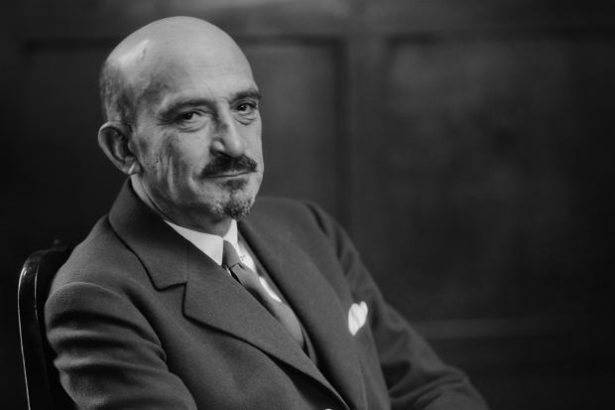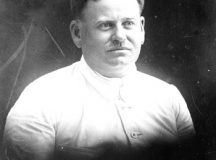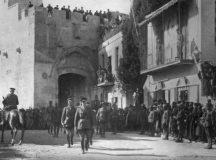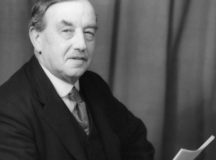The British Prime Minister David Lloyd George believed that ChaimWeizmann would become ‘the one name that will be remembered in Jewish history a thousand years from now’. Hyperbole, for sure, but Azriel Bermant’s researches in the Guardian Archive at the University of Manchester reveal that he was indeed central to the discussions that led to the Balfour Declaration.
The 100th anniversary is an opportune moment to revisit the role played by Chaim Weizmann, Zionist statesman par excellence, in the decision by the British government to issue the Balfour Declaration in November 1917. In the decades following the Declaration, Weizmann certainly revelled in the adulation of Britain’s political and intellectual giants, including many leading progressives and liberals. David Lloyd George believed that his would become ‘the one name that will be remembered in Jewish history a thousand years from now’. Winston Churchill described him as the ‘ablest and wisest leader of the cause of Zionism’ (Rose, 1986; 246). Richard Crossman, the Labour Member of Parliament and minister in the first government of Harold Wilson, believed that through the course of the twentieth century, ‘the histories of Great Britain and of the Jewish people have been tragically yet providentially intertwined – and the man chiefly responsible for this was Chaim Weizmann’ (Crossman, 1960; 13).
Chaim Weizmann
Weizmann was born in Minsk, White Russia (Belarus) in 1874. It was there as an 11-year-old boy that he developed his passion for the Zionist cause, while living under Tsarist suppression and the savagery of the pogroms. Weizmann believed that the rebirth of the Jewish people in their own ancestral homeland had to become a reality and he moved to Britain in 1904 believing that the preeminent global power possessed the means to bring this about. In his autobiography, Trial and Error, Weizmann wrote that he sensed that Britain might ‘show a genuine sympathy for a movement like ours,’ while also suggesting that Britain provided better prospects for his progression as a scientist. He added that ‘there were no other reasons that I can recall, except my profound admiration for England’ (Weizmann, 1949; 124). Yet, as Chaim Raphael has pointed out in his fascinating essay, ‘Chaim Weizmann: The Revelation of the Letters,’ the Zionist leader was being disingenuous (Raphael , 1974). A clue to Weizmann’s real intentions can be found in a 20 October 1903 report he sent to Menahem Ussishkin and other Zionist leaders of the time, in which he wrote:
I brought the impression away from London that we can accomplish a great deal there. We can win over influential circles; we must manifest our desire for Palestine with deeds rather than shallow phrases. We must place our political activities – or call it what you will, I simply call it propaganda – in the hands of first-rate men, who will patiently win over the sympathies of Europe … (Weisgal, 1972; 68)
In January 1906 Weizmann was introduced by Anglo-Jewish leader Charles Dreyfus to Arthur James Balfour, the leader of the Conservative Party. Balfour asked Weizmann why some Zionists were fiercely opposed to the idea of Uganda as a home for the Jews. Weizmann responded that ‘the Uganda offer was well meant’ but the Jews ‘have never accepted defeat and have never forsaken the memory of Palestine’. At the end of the meeting, Balfour stated, ‘It is curious. The Jews I meet are quite different.’ Weizmann countered, ‘Mr. Balfour, you meet the wrong kind of Jews.’ (Rose, 1968; 102)
C.P. Scott and the Guardian
By October 1914, Weizmann was convinced that the Allies would emerge victorious in the First World War, predicting that ‘Palestine will fall within the influence of England’ and expressed his hope that ‘England will understand the Zionists better than anyone else’ (Weisgal, 1972; 25). A few weeks earlier, on 16 September 1914, Weizmann recorded in his diary that he had met C.P. Scott, the editor of The Manchester Guardian (later, The Guardian) who was ‘quite prepared to help … in any endeavour in favour of the Jews … Scott carries great weight and he may be useful’(Ibid. 9-10). This was something of an understatement.
Two months later, Weizmann would write to Scott, arguing that ‘should Palestine fall within the sphere of British influence and should Britain encourage a Jewish settlement there, as a British dependency, we could have in 25-30 years about a million Jews out there, perhaps more; they would develop the country, bring back civilisation to it, and form a very effective guard of the Suez canal and – perhaps be a valuable protection against an aggression from Constantinople … Palestine can easily become an Asiatic Belgium in the hands of the Jews’(Ibid. 38).
By the end of November 1914, Scott had informed Weizmann of his discussions about Palestine with the British Prime Minister Lloyd George, telling him that the British leader wanted to see Weizmann in the presence of cabinet minister Herbert Samuel. Following his meeting with Samuel, Weizmann wrote to Scott in great excitement on 13 December 1914 about Samuel’s ‘plans for the establishment of a Jewish community in Palestine under the British protectorate’. Weizmann told Scott that he and the entire Zionist Movement was in his debt for organising the meeting (Ibid. 79-80).
Weizmann’s relationship with Scott was vital in securing The Manchester Guardian’s support for Zionist aspirations in the months before the Balfour Declaration. In a letter to Scott on 14 February 1916, the president of the English Zionist Federation wrote that it was ‘a source of comfort and consolation … to find your great journal so sympathetic both towards the woes and the hopes of the people of Israel … We could expect nothing different from an organ which has consistently stood for the most enlightened Liberalism…’ (The Guardian Archive, 1916) In July 1929, on the occasion of Scott’s retirement as editor, Isidor Sandler of the Manchester Zionist Association wrote to him expressing gratitude ‘for the great part you have taken in the promulgation of the now famous Balfour Declaration…’ (The Guardian Archive 1929) Scott’s response to Sandler was emphatic: ‘From the first day that I discussed the Zionist project with my old friend Dr. Weizmann I was convinced of its value not only for the Jewish people but for other nations as a connecting link between East and West.’(The Guardian Archive, 1929) Here was early evidence of Weizmann’s apparent ability to win over Britain’s political and intellectual classes on the question of a Jewish homeland.
Weizmann and London
Fascinatingly, Crossman believed that the British ruling classes were attracted to Weizmann not because of his love of Britain but rather because of his Jewishness:
The attraction of Weizmann for the British was precisely that he was the most Jewish Jew we had met. He impressed us because he was not Western, because he was not assimilated, because he was utterly proud to be a Russian Jew from the Pale, because he had no feeling of double loyalty, because he knew only one patriotism, the love of a country that did not yet exist. (Crossman, 1960; 41)[1]
According to this view, Weizmann’s talent was in convincing the British political and intellectual classes that the British and Jewish peoples were united by common interests and a shared destiny. Yet, as Avi Shlaim has argued in The Iron Wall, Weizmann was mistaken in believing that the convergence of British and Jewish interests would stand the test of time. As Britain withdrew from the promises made in the Balfour Declaration, Weizmann became deeply disillusioned with the British leadership. In a letter to Lord George Lloyd, the Secretary of State for the Colonies, in November 1940, Weizmann could not hide his despair:
The implementation of a new part of the White Paper under a Government mostly composed of men who have publicly condemned it would tell world Jewry that Great Britain has definitely abandoned them to the Arabs, to be a hopeless minority in a Palestinian Arab state … it would deal a most severe blow to Jewish co-operation with Great Britain. (The Guardian Archive, 1940)
Yet Weizmann clung to the belief that there was no other option but to continue working with London as the Mandatory power. The Zionist leadership perceived the British White Paper of 1939 with its restrictions on Jewish immigration as a severe act of betrayal. Even so, in a letter to Churchill in April 1943, Weizmann would write:
I refuse to give up this hope. I still believe that the final word of Great Britain in regard to Palestine and the Jews has not yet been spoken. The slaughter of European Jewry can only be redeemed by establishing Palestine as a Jewish country. (The Guardian Archive, 1943)
The State of Israel would eventually be established five years later, but it would take many years for Britain’s relationship with Israel to fully recover from the tumultuous Mandate period. Tragically, this was something that Weizmann never lived to see. He died on 9 November 1952.
Inevitably, with the passage of time, the traditional narrative about Weizmann has frayed at the edges. As Britain’s policy in the Middle East has been re-examined, scholars have questioned whether the role of Zionist leaders such as Weizmann have been exaggerated, while the real motivations of British statesmen have been overlooked. Thus, it is argued that British politicians such as Balfour and Samuel were only too happy to support Weizmann in his propaganda campaign, believing that support for a Jewish homeland in Palestine would result in the intervention of Jewry on behalf of the British war effort against Germany. According to this thesis, the Balfour Declaration was influenced less by British strategic interests or high-minded support for Zionism but rather by anti-Semitic perceptions that world Jewry was a force which could rally public opinion in the US and Europe behind Britain. In other words, Weizmann was actually used by the British, but he was hardly an ‘unwitting pawn’.[2] It is possible that Weizmann played on such fears and anti-Semitic images of Jewish power to enlist British support for Zionist aspirations (Schneer, 2001; 366).[3]
Balfour himself harboured anti-Semitic prejudices which Weizmann knew only too well. In one conversation, Balfour admitted that he shared many of the anti-Semitic ideas held by his friend Cosima Wagner (the widow of the notoriously anti-Semitic German composer Richard Wagner) and had in the past referred to Anglo-Jewry as an alien presence, ‘a people apart’(Renton, 2007; 18). In Weizmann’s defence, one has to point out that he was operating in a different era when genteel anti-Semitic prejudice was rife. Weizmann bore such prejudice with equanimity (Rose, 1986; 86). Of greater consequence in his eyes and in those of his contemporaries was Balfour’s support for the rebirth of the ancestral Jewish homeland in Palestine.
[1] Crossman also noted that Weizmann ‘was a Jew who obviously preferred the company of British Gentiles to that of assimilated Jews.’ Weizmann was particularly scathing of assimilated German Jews: they turned their back on their fellow Jews while seeking to ingratiate themselves with their host society yet they were never recognised as Germans.
[2] For example, this is an argument advanced by James Renton in The Zionist Masquerade: The Birth of the Anglo-Zionist Alliance, 1914-1918, (New York: Palgrave Macmillan), 2007.
[3] The noted Israeli historian, Tom Segev, argued in his New York Times review of Schneer’s book that ‘Weizmann successfully pretended that the Jews were in fact turning the wheels of history. For once, the anti-Semitic image of the Jews proved useful — they were believed to be so maliciously dangerous that one would do best to acquire them as allies rather than as enemies.’ Tom Segev, ‘View with Favour’, New York Times, August 20, 2010. http://www.nytimes.com/2010/08/22/books/review/Segev-t.html
Bibliography
Crossman, Richard, A nation reborn: the Israel of Weizmann, Bevin and Ben-Gurion, (London: Hamish Hamilton), 1960.
Raphael, Chaim, Chaim Weizmann: The Revelation of the Letters, (London: The Anglo-Israel Association), 1974.
Renton, James, in The Zionist Masquerade: The Birth of the Anglo-Zionist Alliance, 1914-1918, (New York: Palgrave Macmillan), 2007.
Rose, Norman, Chaim Weizmann, (New York: Viking) 1986.
Schneer, Jonathan, The Balfour Declaration: The Origins of the Arab-Israeli Conflict, (London: Bloomsbury), 2001.
The Guardian Archive, (John Rylands University Library, University of Manchester), C.P. Scott Papers, Folder Ref: 334/67-152, Ref: 334/73, 14 February 1916.
The Guardian Archive, C.P. Scott Papers Folder Ref: 135/233-591, Ref: 135/570, 31 July 1929.
The Guardian Archive, C.P. Scott Papers Folder Ref: 135/233-591, Ref: 135/571, 02 August 1929.
The Guardian Archive, Lewis Namier Papers, Folder Ref: B/N8A/1-150, Ref: B/N8A/204, 2 April 1943.
The Guardian Archive, W.P. Crozier Papers, Folder Ref: 145/30-44, Ref:145/40/314a, 22 November 1940.
Weisgal, Meyer W., (ed.), The Letters and Papers of Chaim Weizmann, Volume III, Series A, (London: Oxford University Press) 1972.
Weisgal, Meyer W., (ed.), The Letters and Papers of Chaim Weizmann, Volume VII, Series A, (Jerusalem: Israel Universities Press) 1975.
Weizmann, Chaim, Trial and Error: the Autobiography of Chaim Weizmann, (London: H. Hamilton) 1949.






































Wasn’t until death of Tony Cooper 7th Earl of Shaftesbury (real father of the Zionist state) that Jews allowed in Parliament. Zionist anti-Semites that Herzl said would be his most dependable friends. So many articles that have
Jews playing the major part of 1917 and Protestant England along for the ride. No real push-back from Protestantism.
Zionism not the will of world’s Jews, 1917. It eeds to be said.